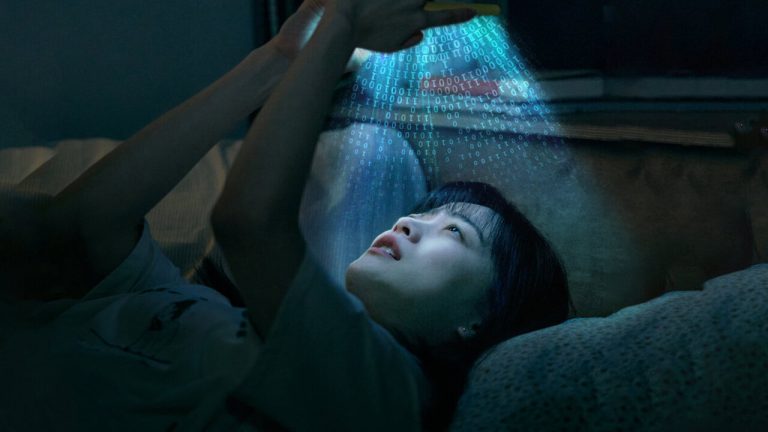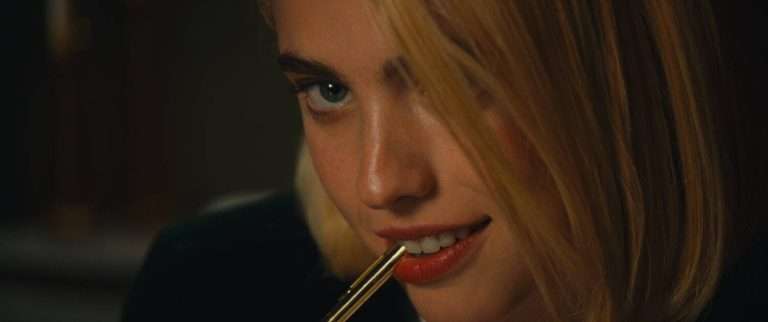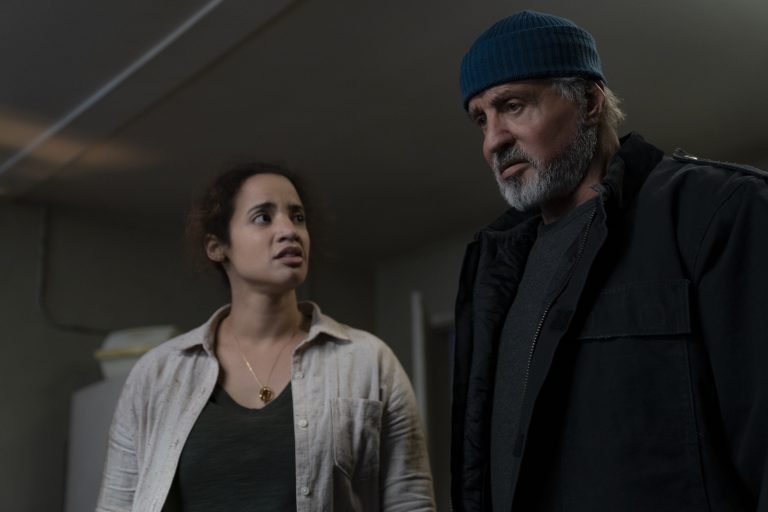Over the past few years, we have been blessed with a wave of utterly impeccable first-time features, notably Celine Song’s “Past Lives,” Charlotte Wells’ “Aftersun,” and Fran Kranz’s “Mass,” to name but a few, that actress-turned-director Kate Cobb’s debut “Okie” comes across as unfortunately underwhelming. Somewhat stilted acting, uneven tonal issues, and a distinct lack of subtly whilst simultaneously feeling confused in its messages make for an inauspicious cocktail of failed ideas delivered in an unpleasant and vaguely mean-spirited manner, making it a challenging watch.
Premiering at the Santa Barbara International Film Festival, the film revolves around “lucky” Louie (Scott Michael Foster) returning to his hometown after the recent death of his Father. He is forced to reconcile with several figures from his past, including an old flame, Lainey (Kate Cobb), and a former friend, Travis (Kevin Bigley). His reception is frosty, however, as during the intervening period, he gained success as a writer, his novels primarily serving as negative reflections and misrepresentations of this hometown.
Positioning us with Louie throughout the narrative is a questionable decision as the protagonist is built to be unlikeable, committing a number of faux-pas and downright inexcusable acts that, on the one hand, serve to demonstrate how out of touch he has become, but on the other hand will turn audiences away from the film, following such an unlikeable protagonist with limited redeeming qualities. Perhaps one could argue grief over his recently deceased father has caused him to act out of character, but we never come to view him in a positive light, and the explorations of grief are not nuanced enough, barring an interesting metaphor of the death severing his connection to his hometown, to justify this reading.
Scott Michael Foster also doesn’t possess enough screen charisma to sell you on the character. He delivers every line with a similar tone, so much so that it isn’t obvious what is played for laughs and what is supposed to be serious. A moment towards the end also required a build-up of complex emotions that Foster wasn’t able to capture. Supporting performances are surfaceable, but it misses the opportunity to utilize them as a way to flesh out the world, and they instead merely serve to further Louie’s arc in some way and are entirely functional in presentation.

The stilted acting is not aided by a cliche screenplay. Every line serves to set up the next without any subtext, except for some lines that seem to explicitly state themes and arrive out of nowhere, hindering the flow of the conversations and, thus, the film. Conversations also just seem to occur, with every character placed exactly where they need to be, having the exact conversation they need to in order to further the plot.
The film becomes tiresome, jumping from plot beat to plot beat, and everything feels a little rushed, where it should have left room to breathe and allow Louie to really experience his hometown. Sentimental moments feel unearned, and comedic moments feel undercharacterized. Louie feels a rather passive protagonist, which, in conjunction with the aforementioned unlikeability, makes him hard to engage with. Some of the comedy would probably read well on the page but doesn’t quite work within the context of the film. Humorous moments such as references to a skydiving accident should have been funnier than they were and may have been, should the characters speaking the lines have been better characterized beyond simplistic traits.
Visually, the film’s camerawork feels a little unmotivated, and there are interesting attempts at expressive editing, but it feels so out of sync with the rest of the film that it doesn’t have the intended effect and instead works to further disengage you with the film. The film deserves props for its incorporation of product placement, which is laughably obvious but at least influences the plot. However, the narrative itself is incredibly contrived and doesn’t ever force Louie into positions where he must make active decisions. The only decisions he does make are ones that sour us even further towards him.
“Okie” is not unwatchable. Having said that, it feels like a first feature in the worst way. It feels rushed, and its themes feel underexplored, but at least it is cohesive on the whole. The acting holds the film back more than anything, with nobody engaging enough to become absorbed in the film and all playing fairly mean-spirited characters that we are meant to root for in parts. The film is tonally inconsistent, unable to strike a balance between drama and comedy, and feels like a separate movie from scene to scene.
Perhaps the most egregious crime committed by the film is in its attempts to present itself as an exploration of a place without doing the legwork to really make you feel as if you understand it. Flashy edited montages and characters regurgitating why they love or dislike the place don’t allow the audience to recognize it as a living and breathing space, and it all feels so aimless in jumping from location to location. Kate Cobb shows promise but is one that sadly fails to come together and execute the vision that is somewhat evident in the final product.




![A Spike Lee Joint: Summer of Sam [1999]](https://79468c92.delivery.rocketcdn.me/wp-content/uploads/2018/06/Summer_OF_SAM-768x432.jpg)


![Starfish [2019] Review: A listless monster-film treading on the aftermaths of Grief](https://79468c92.delivery.rocketcdn.me/wp-content/uploads/2019/03/starfish-1-768x322.jpg)
